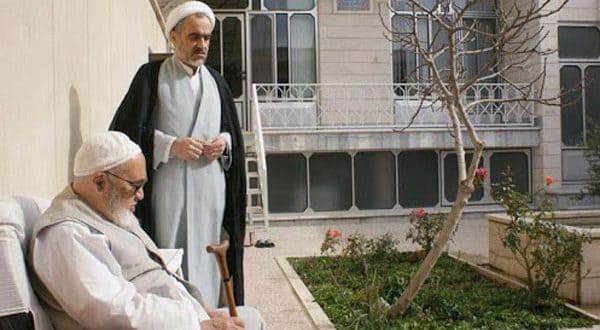The son of Ayatollah Hossein Ali Montazeri, a former deputy to Iran’s first Supreme Leader Ayatollah Rouhollah Khomeini says he has access to a tape recording showing the Islamic Republic’s culpability in executing thousands of political prisoners in 1988.
Ahmad Montazeri says he is not “authorized” to disclose the contents of the tape. In 2016 he released another tape of his father’s conversations with four clerics who are known as the “death committee” tasked with carrying out Khomeini’s order to execute the prisoners. In that tape, the elder Montazeri scolds the clerics about the executions, saying it violates religious and moral laws.
The new tape is supposedly another conversation his father had with the four clerics after the execution were carried out.
Montazeri revealed some information about the new tape in a video released on December 20, but it is not clear when the video has been recorded.
The Iranian Judiciary sentenced the younger Montazeri to 21 years in jail in 2016 for releasing the first tape, but this sentence was not carried out.
Security forces have threatened Montazeri’s with six-year imprisonment if he reveals any further information about his father’s attempt to prevent the executions.
Montazeri’s son’s jail sentence for disclosing the contents of the first tape was reported suspended after Ayatollah Shobeiri Zanjani of the Qom Seminary intervened in the case and Supreme Leader Ali Khamenei accepted his appeal to forgive Montazeri’s son.
In the first tape Ayatollah Montazeri warned the four clerics appointed by Khomeini that what they were doing was a “the biggest crime committed by the Islamic Republic” which he said “would be condemned by the world.”
The clerics, Shariah Judge Hossein Ani Nayeri, Tehran Prosecutor Morteza Eshraqi, Deputy prosecutor Ebrahim Raeesi (Raisi – currently Iran’s Judiciary Chief), and Intelligence Ministry Representative Mostafa Pourmohammadi were supposed to convey Ayatollah Montazeri’s warning to Ayatollah Khomeini, but instead, they gave the message to his son Ahmad, who insisted that “the executions must go ahead” as planned, said Montazeri’s son.
He added that in the second meeting with Ayatollah Montazeri a month later, the Ayatollah asked the four clerics why they handed over the message to Khomeini’s son. The four clerics said “they had no other option,” Montazeri’s son quoted them as having said.
After the release of the first tape, reports said that Ahmad Montazeri had refused to hand over the audio files to the Intelligence Ministry.
Iranian officials usually do not speak about the 1988 massacre in Iranian prisons. However, one of the four clerics on the “death committee”, Mostafa Pourmohammadi has defended his past in an interview in 2018.
Amnesty International condemned the killings following this admission and drew the attention of the international community to the crime.
The reason for the silence is that both the leading political factions of Iran were involved in the massacre in Iranian prisons in 1988.
Most of the prisoners killed by Iranian security forces were the members of Mojahedin-e Khalq (MeK), and Marxist political groups who had already stood trial and were serving their sentences but were executed at Khomeini’s order.
Many of those executed were buried hurriedly in mass graves in various parts of Iran. Their families found out about some of these mass graves years later, but still the government prevents them from mourning on the sites for their loved ones.
A UN Special Rapporteur for Human Rights has said 1,879 prisoners were executed in 1988. Ayatollah Montazeri puts the number in his memoires at 2,800 to 3,800 and some political groups believe the actual number is much higher.

